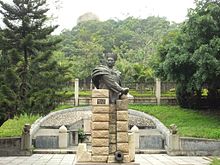|
Chen Huacheng
Chen Huancheng (Chinese: 陳化成; pinyin: Chén Tiānhuá; 1776–1842) was a 19th-century military leader of Qing China.[1] He served as the provincial military leader in Jiangnan Province before being killed in the First Opium War.[2] BiographyChen joined the Imperial Army at a young age, in which he served as a standard bearer. Unlike some of his contemporaries, he rose from the ranks of the army to a command position without taking the customary Wu Keju Imperial Examinations.[1] His early promotions were due to his success in suppressing piracy.[2] In 1830, Chen was promoted to Admiral of Fujian Province by the Daoguang Emperor. During this time, he was stationed in Xiamen. He was promoted again in 1840 when he became a Jiangnan Admiral, the highest rank in the Imperial Navy.[2] During the First Opium War, Chen commanded the Chinese defenses at the mouth of the Yangtze River.[2] He swore to defend the waterway and began to fortify his position against British incursions. On 16 June 1842, a British fleet sailed up the Yangtze and began to bombard Huacheng's position at Wusong.[3] While commanding the Chinese fort there, Chen was killed by either naval artillery or in hand-to-hand combat with the British.[4] LegacyChen was declared a national hero after his death. A tomb and museum are erected in his honor in Shanghai.[5][2] References
|
||||||||||||
Portal di Ensiklopedia Dunia
